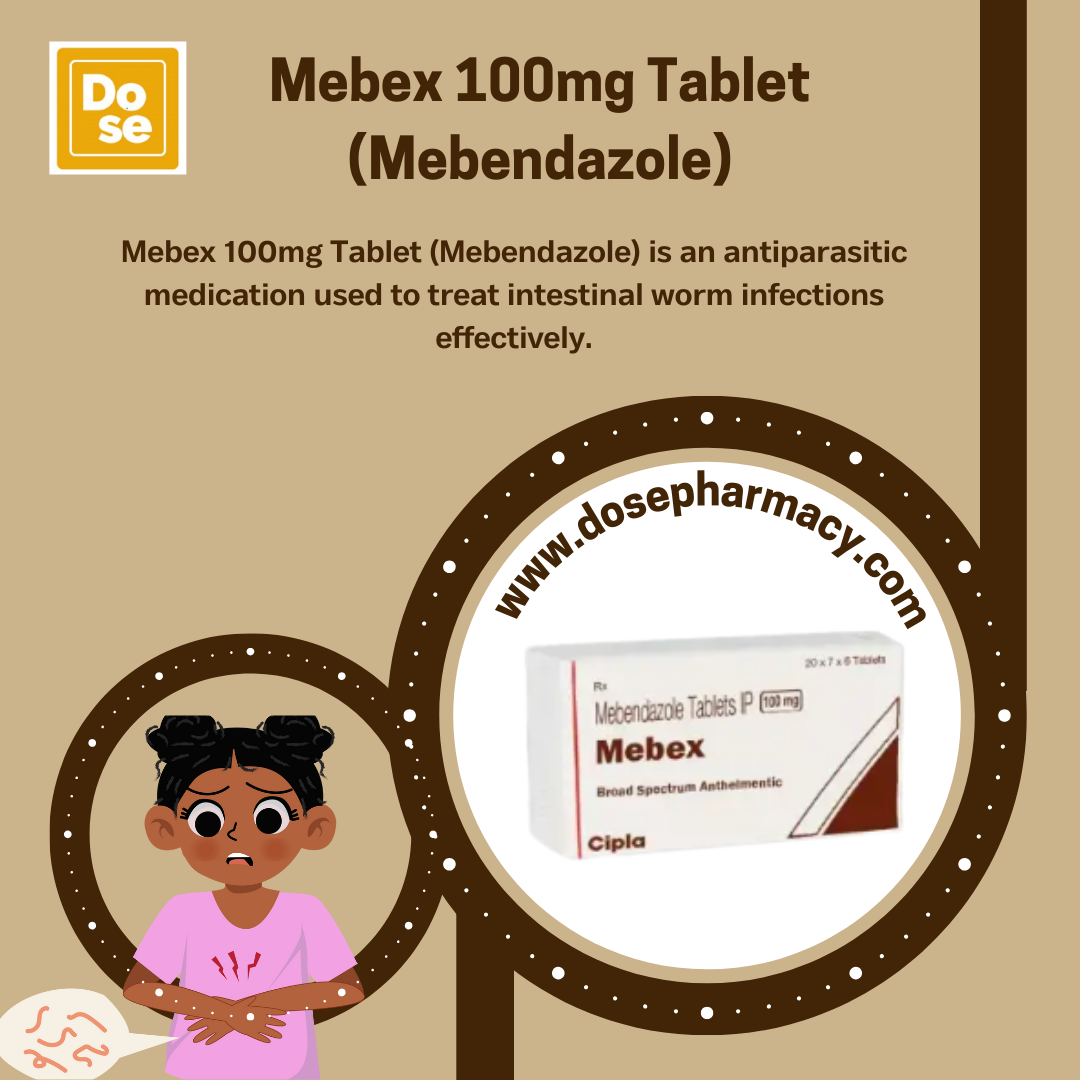Mebendazole over the counter is a widely used anthelmintic (anti-parasitic) medication prescribed to treat various intestinal worm infections. Known for its high efficacy and safety profile, Mebendazole is often the first-line treatment for several parasitic infections, especially in children. But exactly which parasites does Mebendazole target? Understanding this can help patients and caregivers use the medication more effectively and prevent reinfection.
This article explores the different parasites Mebendazole is used against, how it works, and what to expect during treatment.
What Is Mebendazole?
Mebendazole belongs to the benzimidazole class of medications. It works by inhibiting the ability of parasites to absorb glucose, effectively starving them to death. This leads to a slow breakdown of the worms, which are then eliminated naturally through the stool. You can also buy mebendazole online from dosepharmacy.
It is typically taken as a single oral dose or twice daily for three days, depending on the type and severity of the infection. Mebendazole is available under various brand names, including Vermox, Ovex, and generic formulations.
Key Parasites Targeted by Mebendazole
Mebendazole is effective against several types of intestinal worms, especially soil-transmitted helminths (STHs). These parasites enter the human body through contaminated food, water, or soil, and reside in the intestines.
Here are the primary parasites that Mebendazole targets:
1. Pinworms (Enterobius vermicularis)
- Common in: Children, especially in school settings
- Symptoms: Itching around the anus (especially at night), restlessness, disrupted sleep, mild abdominal pain
- Transmission: Fecal-oral route; eggs spread via contaminated hands, surfaces, or clothing
Mebendazole Effectiveness:
Pinworm infections are one of the most common indications for Mebendazole. A single 100 mg dose is usually sufficient, but a second dose is often recommended two weeks later to eliminate newly hatched worms.
2. Roundworms (Ascaris lumbricoides)
- Common in: Areas with poor sanitation, especially in tropical and subtropical regions
- Symptoms: Abdominal pain, nausea, coughing (due to larval migration), weight loss, visible worms in stool
- Transmission: Ingestion of eggs in contaminated food, water, or soil
Mebendazole Effectiveness:
Highly effective against roundworms. It paralyzes and kills adult worms in the intestines. A 3-day course (100 mg twice daily) is typically used for optimal results.
3. Whipworms (Trichuris trichiura)
- Common in: Rural areas with poor sanitation
- Symptoms: Abdominal discomfort, chronic diarrhea, iron-deficiency anemia, growth retardation in children
- Transmission: Ingestion of eggs in contaminated food or water
Mebendazole Effectiveness:
Mebendazole is one of the recommended treatments for whipworm infections, though it may be slightly less effective compared to albendazole. A 3-day course is typically used.
4. Hookworms (Ancylostoma duodenale and Necator americanus)
- Common in: Tropical climates, particularly in areas where people walk barefoot
- Symptoms: Iron-deficiency anemia, fatigue, abdominal pain, protein loss
- Transmission: Larvae penetrate skin (often through bare feet), then travel to the lungs and intestines
Mebendazole Effectiveness:
Effective in killing adult hookworms. It helps reduce egg counts and improves symptoms like anemia and fatigue. A 3-day course is typically advised.
5. Threadworms (Strongyloides stercoralis) – Limited Effectiveness
- Common in: Tropical/subtropical regions
- Symptoms: Abdominal pain, diarrhea, skin rash, potential for severe infection in immunocompromised patients
- Transmission: Skin penetration by larvae, similar to hookworms
Mebendazole Effectiveness:
Mebendazole is less effective against Strongyloides. Albendazole or ivermectin are typically preferred. However, in some mild cases, it may offer partial relief.
Less Common Parasites (Limited or Partial Effectiveness)
While Mebendazole is most commonly used against the five parasites listed above, it may offer limited benefit against others:
6. Tapeworms (Taenia spp.)
- Effectiveness: Poor. Mebendazole is generally not recommended for treating tapeworms. Praziquantel or niclosamide is the preferred treatment.
7. Trichinella spiralis
- Cause of: Trichinosis (from undercooked pork)
- Effectiveness: Can be used in combination with corticosteroids during early stages, but albendazole is often preferred.
How Mebendazole Works
Mebendazole kills worms by disrupting their microtubule structure and blocking glucose uptake, which leads to energy depletion. Without energy, the parasites lose their ability to maintain vital functions and die slowly. Unlike some antiparasitic drugs that paralyze worms immediately, Mebendazole works gradually, which reduces the risk of sudden inflammatory reactions in the intestines.
Signs of Worm Infections Mebendazole Can Treat
- Persistent itching around the anus (especially at night)
- Abdominal pain or cramps
- Diarrhea or constipation
- Unexplained weight loss
- Presence of worms in the stool
- Fatigue or anemia
If you or your child shows these signs, consult a healthcare provider. A stool test may confirm the type of parasite, allowing for appropriate treatment.
Dosage and Administration
Mebendazole is available in tablet or chewable form. The typical dosing is:
- Pinworms: 100 mg once; repeat in 2 weeks if necessary
- Roundworms, Hookworms, Whipworms: 100 mg twice a day for 3 days
Important Tips:
- Take with or without food
- Chew tablets thoroughly or crush for young children
- Treat all household members in case of pinworm infection to prevent reinfection
Side Effects of Mebendazole
Most people tolerate Mebendazole well. Possible side effects include:
- Abdominal pain
- Gas or bloating
- Diarrhea
- Rash (rare)
- Liver enzyme elevations (with prolonged use)
Severe allergic reactions are rare but require immediate medical attention.
Who Should Not Use Mebendazole?
Avoid Mebendazole if:
- You are pregnant (especially during the first trimester)
- You have a known allergy to Mebendazole
- You are taking metronidazole (may increase risk of severe skin reactions)
Always consult your doctor before starting any medication.
Mebendazole is a highly effective and safe treatment for several common intestinal parasites, including pinworms, roundworms, hookworms, and whipworms. Its broad-spectrum action and simple dosing make it a popular choice, especially in pediatric settings and community deworming programs.
However, it is less effective or inappropriate for treating tapeworms or Strongyloides, where other medications are preferred.
When taken correctly, Mebendazole not only treats active infections but also helps reduce the spread of parasitic diseases—especially in areas with poor sanitation or hygiene.



